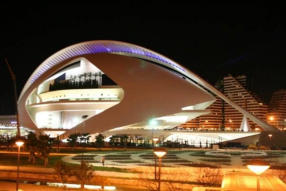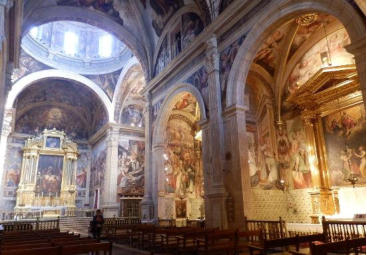


Social Events








News
ACM/IEEE 17th International Conference on Model Driven
Engineering Languages and Systems
Satellite Events / SAM Conference Welcome Reception
Auditorium - Blue Cube
September 29th, 2014
(18:30 - 20:30)
The reception will feature a concert of traditional Valencian music (dolçaina) and a welcome cocktail.
The dolçaina is a woodwind instrument of the oboe family, traditional in Valencia (although similar
instruments are found across Spain and around the world). It is played together with the tabalet, a
percussion instrument, interpreted in different melodies from traditional Valencian villages and cities.
The repertoire of these instruments is made up of traditional dances, folk music parades, and albaes
(a type of traditional song accompanied by these instruments). In the 70’s of the 20th century these
instruments were on the verge of disappearing as a result of the lack of specialized musicians.
However, the art of playing these instruments is currently being revitalized due to their increased
popularity.
Main Conference Welcome reception at the Real Colegio del Patriarca
October 1st, 2014
(19:40 - 21:40)
Built in the 16th century and comprises the Royal College, the seminary and the church (also known
as “The Valencian Sixtine Chapel”). The different buildings and rooms are set around a large
Renaissance cloister.
The collegue and seminary was founded in 1583 by San Juan de Ribera. It is an important building
architected for reflecting the importance the Italian Renaissance had in Spain. But perhaps this
seminary's most important architectural feature is the cloistered patio, considered one of the most
beautiful within the Spanish Renaissance. The building also hosts the Patriarca museum with a
collection of paintings from the 16th and 17th centuries, including works by El Greco, Caravagio,
Juan de Juanes among other painters. The reception of the MODELS 2014 conference will include a
cocktail in the Renaissance cloister, a visit to the collection paintings of the Patriarca museum and
an Organ concert in the church (the Valencian Sixtine Chapel).
The Patriarca is located in the historic center of Valencia.
Real Colegio del Patriarca
Calle de la Nave, 1
46003, Valencia, Spain
How to reach the Real Colegio Seminario del Patriarca from CPI-UPV:
•
By metro:
1.
Walk to the Serreria station
2.
Take the tram line # 4 or #6 from Serrería until Benimaclet Station (line #4: Mas del Rosari,
line #6: Tossal del Rei) View map
3.
In Benimaclet station, change to subway system line #3 from Benimaclet Station until Colon
Station (line #3: Aeropuerto or line #3: Av. del Cid) View map
4.
Walk to Real Colegio Seminario del Patriarca: Head West on Carrer Don Juan de Austria
towards Carrer de les Monges de Santa Caterina. Turn right onto Carrer del Dr. Romagosa.
Turn left onto Carrer de Salvà. Turn right onto Place del Colegi del Patriarca. View map
•
By bus (EMT):
1.
Walk to the Tarongers Station. View map
2.
Take the bus line #29 towards CID - Marcelino Oreja (13 mins, 10 stops) until General Elío
Vivers. View map
3.
Change the bus line #9 towards Real de Madrid until Pau de Bonaire. View Map
4.
In Pau de Bonaire station head west on Carrer de la Pau towards Carrer de les
Comèdies.Turn left onto Carrer de la Creu Nova. Turn right onto Place del Colegi del
Patriarca. View Map
Conference Banquet at the Ciudad de las Artes y las Ciencias (PALAU DE LES ARTS)
October 2nd, 2014
(20:00)
The City of Arts and Sciences (Valencian: Ciutat de les Arts i les Ciències; Spanish: Ciudad de las Artes
y las Ciencias) is an entertainment-based cultural and architectural complex in Valencia. It is the most
important modern tourist destination in the city.
Designed by Valencian architect Santiago Calatrava and started in July 1996, it is an impressive
example of modern architecture. The "city" is made up of the following, usually known by their Valencian
names: El Palau de les Arts Reina Sofía — Opera house and performing arts centre; L'Hemisfèric
— Imax Cinema, Planetarium and Laserium; L'Umbracle — Walkway / Garden; El Museu de les
Ciències Príncipe Felipe — Science museum; Ágora — A versatile space that allow the holding of
varied events; Oceanografic — Open-air aquarium (the largest aquarium tank in Europe with more
than 45,000 marine creatures).
The banquet of the MODELS 2014 conference will take place in the main Hall of the Opera house
(Palau de Les Arts Reina Sofia). The banquet opens at 20:00h with a cocktail and a performance of
traditional Valencian music (Dolçaines i percussió) and dance.
The Valencian dances are one of the richest repertories in terms of variety. Dances like jotas,
fandangos, malagueñas, danses, seguidillas, etc. are part of the corpus of our traditional dances. The
clothing is one of the most important items in the world of the traditional dance. Depending on the area,
the dances change its clothing and the used materials to weave it. So in colder inland areas, we could
find more warm knitting in order to better withstanding the low temperatures. However, in the coastal
areas we could find cooler knitting. This knitting was made up with the best silks that have been
produced in Valencia for centuries.
Banquet Program
•
20:00 Palau de les Arts opens for MODELS participants
•
20:15 Welcome drink and performance (Dolçaines i percussió & Danses)
•
21:00 Dinner served and awards
The Palau de Les Arts is situated at the end of the former riverbed of the river Turia:
Palau de Les Arts
Ciudad de las Artes y las Ciencias
Av del Profesor López Piñero, 7
46013 Valencia, Spain
How to reach the Palau de les Arts Reina Sofia from CPI-UPV:
•
By bus (EMT):
1.
Walk to Luis Plexo Street. View Map
2.
Take the bus line #1 towards Joaquim Ballester - Ricardo Micó until L’Hemisferic Station.
View Map
















































